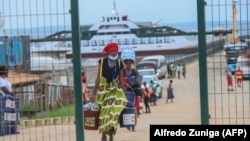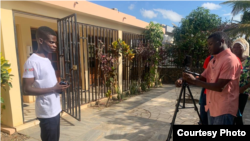For days afterward, he didn’t know where his father was.
“I had to separate from my father to survive. We spent four days without seeing each other. No one knew the whereabouts of the other,” he told VOA Portuguese.
Now 21 and living with relatives in Pemba City, Alfa said his only wish was for stability in the region.
“There is a common song among all displaced people: Peace! We want peace and tranquility and recover the few things we had,” he said.
Alfa is one of 800,000 people internally displaced in Mozambique, according to the United Nations, because of a war between extremist insurgent groups and the Mozambican government that began in 2017.
Many are afraid to go home, fearing that attacks by insurgents or clashes between the rebels and government forces will force them to flee again.
However, authorities say violence has declined in recent months because of support from foreign forces, mainly Rwandan and southern African troops.
That, said Mariana Camaroti of the Red Cross in Mozambique, is allowing some people to return home.
“Since the second half of last year, we have observed that thousands of people have started to return to their home villages in Mocimboa da Praia, [and] Mueda,” said Camaroti, while noting that many “continue to face the same challenges” including a lack of basic services back home.
Rebuilding lives
While the Red Cross and other organizations have stopped short of urging people to return home, several organizations have started projects to assist displaced people in building new lives.
The Red Cross has provided essential household utensils and farming and fishing equipment, and it has assisted with COVID-19 vaccinations for 1.6 million people in hard-to-reach districts in the north and center of the country.
Another such organization is AZUL, a consultancy group focusing on social change in Cabo Delgado.
The group has helped to form what it calls “committees of peace.” These committees are groups made up of IDPs and locals of different ages who are trained to promote conflict resolution in their communities. Committees have been created in six IDP camps.
Aly Caetano, AZUL’s association coordinator, said the organization faces challenges.
“The workload of community leaders — imagine a community leader who has five to six meetings a week with different organizations,” Caetano said, adding that a major challenge is the “lack of resources, particularly in the area of social cohesion.”
Camaroti of the Red Cross said she agreed that there is a need to constantly monitor the volatile situation in which displaced people find themselvees, and to reallocate resources accordingly.
“Humanitarian aid is very much needed to provide emergency assistance to these people and help them start their lives again in the regions of origin, but also long-term assistance so that they can establish themselves and have their own livelihood,” Camaroti said.
This story originated in VOA’s Portuguese Service.








